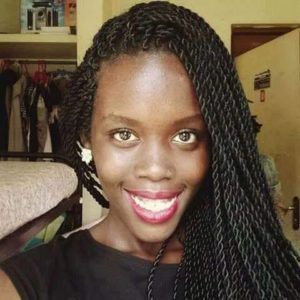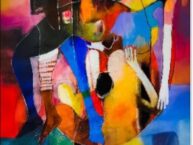 Acan Innocent Immaculate is a 20-year old Ugandan pursuing a Bachelor’s degree in Medicine and Surgery. Writing has always been her first love and she looks forward to a literary atmosphere where African stories will break the mould even more than they do now.
Acan Innocent Immaculate is a 20-year old Ugandan pursuing a Bachelor’s degree in Medicine and Surgery. Writing has always been her first love and she looks forward to a literary atmosphere where African stories will break the mould even more than they do now.
It’s 2050 AD and humanity finally seems to be waking up to the reality that the scientists lied to everyone – the sun is dying and, with it, a civilisation that they painstakingly built over the course of a hundred and fifty thousand years. A skinny Albino boy, maybe fifteen years old, pulls a tee shirt over his head as he walks out of a cosy bungalow and grins up at the red sky. He must be the only human alive who’s happy to see the sun on her glorious deathbed; it’s a relief to not have to wear hats, sun glasses and long-sleeved shirts anymore. The scient ists no one trusts anymore say that the sun has a few weeks to go; days even. The boy’s scuffed sneakers kick up snow as he makes his way down the stairs from the porch and he smiles again. Ten years ago, before the gold of the sun bled out – both figuratively and literally – leaving in its stead a pale red, it would have been a blistering hot day, and any suggestion of the possibility of snow in these parts would have been laughed out of the door and blamed on the many American shows that had taken over African cable television. Now, however, Uganda is experiencing its first winter and one of the greenest countries in the world is now as white as… well, snow.
Inside a large glass dome that’s frosted over, the rounded figure of the boy’s caretaker is visible. The dome is one of many advanced greenhouses that have popped up all around the world in the past decade; a haven for earth’s nearly depleted Plant kingdom and a source of the food that is becoming scarcer and scarcer. The figure moves towards the dome’s opening and the boy grimaces, trying to move as quickly as he can towards the gate. It’s futile.
“Red Sun! Don’t you dare walk out of that gate without a jacket and your oxygen tank!”
Nyambura’s voice is, in Red Sun’s opinion, more cutting than the alien cold that permeates the air of Nakasongola. She is a plump woman, her face shrewd and her skin smoother than one would expect of a sixty-five-year-old woman, and she has been taking care of Red Sun since he was a baby. It is she who, after his parents left in the Mass Exodus, named him Red Sun. She claims that it’s because the sun turned red on the exact date of his fifth birthday but he knows there is more to it; it’s a private joke between her and the lanky, one-legged askari who is Kenyan, like her, and laughs every time he hears or says Red Sun’s name.
With shuffling faintly rebellious movements, Red returns to the house and re-emerges with a thick sweater on and a blue tank strapped to his back. He slaps the gas mask over his nose and mouth and inhales deeply, for Nyambura’s benefit, and then returns it to its perch on his shoulder.
“Happy now?”
The look on Nyambura’s face forebodes another lecture on respect for elders, but she surprises him by crossing the snow-covered compound to hug him tightly. Bemusedly, he looks down at the colourful scarf covering her greying hair and a spurt of rage overtakes him. The people in charge of the Mass Exodus should have taken Nyambura with them on their big exclusive space ships. It shouldn’t have mattered that she was above the age limit they had set, or that she was no genius with perfect genes. She is the perfect embodiment of what the soul of the human race needs; compassionate, loving, altruistic and an expert at wielding an iron glove when the previous qualities do not yield the desired results. Of course, to the single-minded scientists, politicians and environmentalists in charge, those weren’t the qualities required to be allowed onto the ships. When Red was six, the Mass Exodus had begun. There was only room for half of the world’s population, they said. They had to take only the crème de la crème of the race, they said, because it was crucial that when the ships finally stumbled on a habitable planet, humanity put its best foot forward in the race to propagate and continue the race. So the old, the cripples, the diseased, and the people with the genes that had gone haywire… those would have to be abandoned. A sacrifice, for the greater good of the race as a whole, they said.
Red scoffs. He still remembers the day they came for his parents and his sister. Under normal circumstance, his parents would have been left behind – they were both carriers for the albino mutant gene and that was undesirable in the new world the bureaucrats in charge had, but they were brilliant scientists. Red’s father had been an understudy in his mother’s laboratory when, together, they discovered a way to extract oxygen from water and also, a baser chemistry between each other. The bureaucrats needed their skills. He still remembers the foolish trust in his mother’s eyes when the bureaucrats told her they would return for him later. He had stopped waiting when the last ships left the earth. They would be millions of light years away by the time the sun died; the scientists had ensured that.
“Red…” Nyambura’s voice is now gentle, a glaring contrast to the tone she used before, “You’re daydreaming again.”
He wants to laugh. Aren’t daydreams supposed to be something beautiful? He disentangles himself from Nyambura’s arms and this time makes it to the gate without her stopping him. The askari is seated in his little house at the gate, polishing his metallic leg and whistling a merry tune while the one leg that he can still feel taps a beat on the smooth cemented floor.
“Jambo,” Red greets in Kiswahili, his head ducked. He hasn’t quite overcome his wariness of the askari, who they say lost his leg in the Third World War after he had felled an entire battalion of Congolese soldiers. The askari grins, baring a set of teeth blackened by years of smoking and, in a hoarse voice, responds in English, “You’re going out again, eh? Go and explore, boy. See if you can find a solution to our problems in the barrenness out there.”
Red says nothing and continues to walk, the maniacal laugh of the askari following him until he turns the bend that leads to the old man Kazinda’s ranch. It used to be full of cows and bulls but even those have disappeared, taken either by the ravages of hunger or on the spaceships that had been set apart to carry samples of earth’s fauna and flora. Vaguely, Red recalls a rhyme from a Bible story.
The animals went in two by two…
Against his volition, the gruesome images from TV when the animals had started dropping dead from hunger, death climbing up the food chain until all that were left was the vultures and flies that thrived on the dead and the reptiles and amphibians that thrived on the flies, come to the forefront of his mind and he closes his eyes for a moment. And after that, the Great Floods had taken care of the animals that had survived. People had died too, during the Mass Extinction. The flies had carried disease and hunger had driven people to eat the dead animals. The result was a population of the four billion that had been left behind falling to just a few hundred million.
Snow starts to fall. It does that more often these days. The snow stops falling long enough for the hydrogen-powered winter service vehicles to shovel the snow off the roads and then starts up again. Red holds out his hands to catch the white crystals. They float gently into his palms and do not melt – his hands are too cold. He used to hate the snow when it first started to fall. Cold prickly frozen water, sticking to his skin and making his clothes soggy… he really did hate the snow. He understands it better now, though. It did not choose to be here; it was forced into this situation by the dying sun. It is just like him. The snow starts to fall more heavily. Nyambura will soon send the askari with the snow mobile to come get him. Red breaks into a run. He does not want to be found yet.
Nakasongola was a sleepy town before the Mass Exodus. Not small, by any means, but sleepy nonetheless, roused only when the flow of traffic was at its peak. Now, it is a dead town. Snow blows into the open windows of abandoned shops and an old Shell signpost peeks through a huge pile of snow. Red has forgotten what the town looks like underneath the carpet of ice. He makes his way towards the large abandoned church he used to go to with his parents and his sister. The wooden double doors are frozen at the seams and he has to scrape the ice away with his brittle fingernails, the cold making him oblivious to the possibility of frostbite or injury. Halfway through the meticulous task, he has to stop and inhale deeply from his oxygen tank. Red goes back to scraping the ice away; he hopes that the sun dies before the atmospheric oxygen is completely depleted. He would rather cease to exist than live a life that hinges on the insulated metallic tank he hates carrying around. The wind picks up and blows bits of ice into Red’s face. Now the wind, he has always hated and will continue to do so. It is the snow’s bad tempered older cousin, influencing the crystals of ice to go from gently cool to violently frigid and leaving cuts all over Red’s delicate skin. He finally removes the last of the ice sealing the doors shut and pushes them open, his arms straining and his breath huffing out as his muscles eat up the meagre oxygen available to them in an effort to counteract the resistance offered up by the rusty hinges.
The inside of the church is warm. The townsfolk claim that it’s the spirit of the Christian God that keeps the building that way but Red knows better. It was built by American evangelists who preferred their cheaper style of building – double wood walls with air pockets to insulate against the cold. They probably had no idea that the Great Freeze was coming but Red is sure that if they were here today, they would claim that they saw the Great Freeze coming in visions from their God and were instructed to build the church this way. But then, if they were here right now, they would probably be Atheist, like most of the world has become. Another excerpt from the Bible plays in his mind.
Lord, Lord, why have you forsaken me?
It seems to him like it’s the other way round; the world has turned its back on the gods it used to worship. Crime is rampant in the bigger cities where people gather like seals in the Arctic, seeking comfort in the very masses that kill them. Red likes it in his deserted town, where his closest neighbour lives ten minutes away. His sneakers barely make a sound as he walks down the aisle towards the altar. On either side of him, the brown pews are covered with cobwebs whose makers are long extinct. A small door off to the side of the altar is slightly ajar and it is through this door that Red walks.
“You’re underdressed for the weather.”
Red’s companion is standing with his back to the entrance, wearing a thick overcoat and fur boots two sizes too big. He’s shorter than most, his dreadlocked head coming just up to Red’s waist and his hands invisible in the sleeves of the overcoat he probably nicked from a taller person.
“How can you tell?” Red demands.
The dwarf chuckles darkly. “Your teeth are chattering and I can smell your wet sneakers.”
Red ignores the jibe and walks over to the pile of books on the floor, plopping down onto his butt and picking up a book at random. Quantum Physics. These are his mother’s books. He carried them here, methodically, day by day, from the sacred library in the house. A moment later, the dwarf joins him on the floor and picks up a book of his own. They’ve been meeting here for the past four months and the dwarf has been helping him understand the art his parents practised. Nyambura does not approve; dwarves are a bad omen, according to her. However, she no longer bothers Red about his regular visits to the church.
“Let the boy go where he pleases,” the askari is constantly telling her, “We are all going to die anyway, one way or another.”
Sometimes, Red thinks that Nyambura prefers to let him go exploring just so that he doesn’t hear the dark words that spring from the askari’s heart.
“From the heart,” the dwarf is always saying, “That’s where all our words come from. The lies come from the surface and the truths from the deep corners where the light does not reach.”
Red is not sure whether the dwarf is sane or not. He fluctuates with terrifying ease from philosopher to physicist to biologist to linguist to theologian… Every so often, he wanders off with his thoughts, his bleary eyes clearing for that prolonged moment of mental travel, and then he’s back on the floor with Red, telling him the scientists from the eighteenth century had it all figured out, and science had started to go to hell when these newbies from the twenty first century started to believe that they were greater than the universe. Half the time, Red zones out. The thing that holds the most interest for him is The Law of Conservation of Energy. He is fascinated by the idea that nothing ever ceases to exist in reality; that everything is basically energy that will never be destroyed. And so he spends his days with the dwarf poring over writings by Einstein, Galileo, Joule, Leibniz, and Noether, attempting to convince his teenage mind that the certainty of his death should not be a thing that disconcerts him, for he shall continue to live on in another form.
“The end is nigh,” the dwarf says suddenly. Red puts down his book to stare at his formerly silent companion. He recognizes the clear faraway look in his eyes. He’s having one of his episodes again. Red elects to pay attention to the dwarf’s blabbering this time.
“The end is nigh and humanity has brought it upon itself,” the dwarf says in an ominous voice.
We’ll be going out with a bang, Red muses. Isn’t that the only way to go? Outside, the engine of a snow mobile rumbles. A few seconds later, someone pounds at the door. It’s the askari. The dwarf speaks without looking up from his scribbling. “You should go.”
Red gets to his feet without argument. He makes it to the door before the sounds of the dwarf getting up stop him. Slowly, he turns, and is met by the outstretched hand of his eccentric companion. For a moment, he is stumped. The dwarf has never initiated physical contact. Hesitantly, he takes the proffered hand and shakes.
“The first and last time we shall shake hands,” the dwarf says cryptically. His words haunt Red even after he gets home.
That night, Red does not feel like sleeping alone. The sky is a pale pink, and the moon is a bloody red that normally does not irk him but is now making an old apocalyptic Christian hymn play over and over again in his head.
Oh, when the moon, turns into blood…
He climbs out of his parents’ bed and walks out of the master bedroom that he has taken over. Three doors down the hallway, he stops and knocks at Nyambura’s door. She asks no questions and makes no remonstration; simply makes room for him in her bed and wraps her warm arms around him. In her gentle voice, she starts to hum the lullaby she used to sing him before his parents left. A few seconds later, he is asleep.
The heat wakes Red up. It is too intense to be coming from Nyambura’s sleeping form. He throws the blankets back; his body is drenched in sweat and covered in a bright white light that he later realizes is spilling in through the windows to flood the entire room. He makes his way out of the bedroom and out of the house. Outside, the bright light nearly blinds him and makes his sensitive eyes hurt. It reminds him of the days before the Red Giant phase, when he couldn’t step out of the house without layers of clothing and sunglasses. A burn registers on his exposed skin and he steps off the porch; his toes curl involuntarily when his feet hit slush instead of packed solid ice. He slips; his arms flail ineffectually for balance and he lands on the slush with a splash. The pain in his backside goes unnoticed in the face of the blinding burning light.
This is it, he thinks. He half expects the God from Bible stories to descend from the sky, with bronzed feet and a beard and robe as white as the melting snow around him. With considerable effort, he gets to his feet and immediately, a strong invisible wave nearly knocks him back down. Before he can fully grasp the implications of the wave, a gaping chasm cracks across the ground right before him. Red jumps back with a startled gasp. He watches the chasm rip the house he calls home into two and the terror that had been concealed by confusion comes to the forefront. This is actually it. He wants to run into the crumbling house to grab Nyambura, if not to save her, then to throw himself into her embrace and die in the security of her arms. But he can’t get himself to move another step. His mother’s voice is on replay in his mind.
It has always been his destiny to die with the sun, hasn’t it? Of course it has. Red steps towards the chasm. Vaguely, he hears the askari yelling for him to stop over the thundering of a million earthquakes. He couldn’t if he tried to. One foot makes it into the chasm, and then earth’s gravity gives, and Red is floating into the white sky, together with a billion animate and inanimate objects; the askari is visible in his peripheral vision, his posture a study in befuddlement. Another of the waves crashes through the air. A metallic chair sails languorously past Red’s head, and his arms spread out in a sacrificial gesture. He is ready to die. Perhaps he has always been ready to die. The waves continue to come, in quicker succession, and more objects fly past, into Red’s prone body, hitting him with all the impact of a feather. The bright white in the sky is joined by the bright red from the earth’s core as it starts to disintegrate. Is it happening too quickly or too slowly? Red can’t tell. He is reaching for the infinite space that is just a moment away. Suddenly, he can’t breathe. Is there something blocking his nose? He realizes, a second later, that he can, in fact breathe, but it’s the oxygen. The forces of the universe have denied his unspoken request that the sun die before the oxygen is depleted. Or have they? He can’t think clearly now; his brain tissues are feeling the oxygen deprivation. A goofy smile forms on his face. It is goofy; he can tell. The white light is now fading. So is the air. He can’t breathe. His lungs are becoming one with the endless vacuum that is space. One more wave, stronger than the rest, cuts through the sudden blackness. A force starts to pull on Red. Piece by piece, he is disintegrating just as the earth did. Is this what a black hole feels like? The pain does not matter. He is giving back what was taken from the universe to make him. It is just a cycle. His final thought is the only thing that escapes the ravenous pull of the black hole and it is sent out into the vast blackness to float among the stars.
Energy cannot be created or destroyed, but only changed from one form into another or transferred from one object to another.


